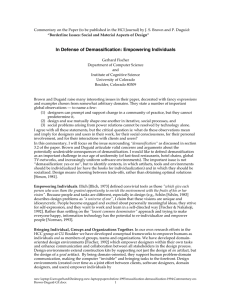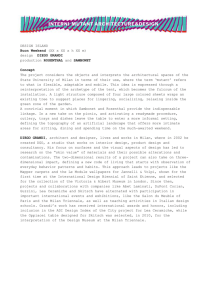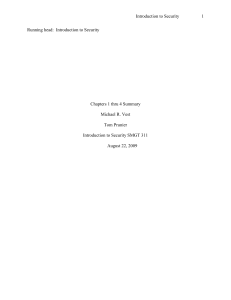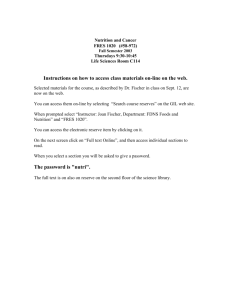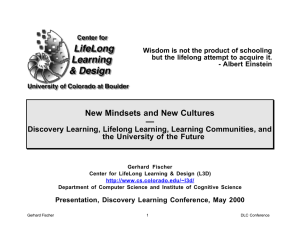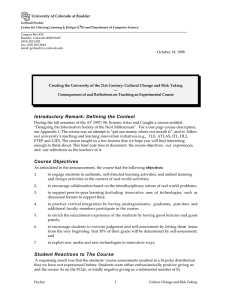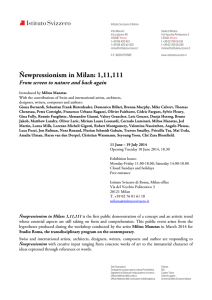Human-Centered Computing Themes for the Future
advertisement
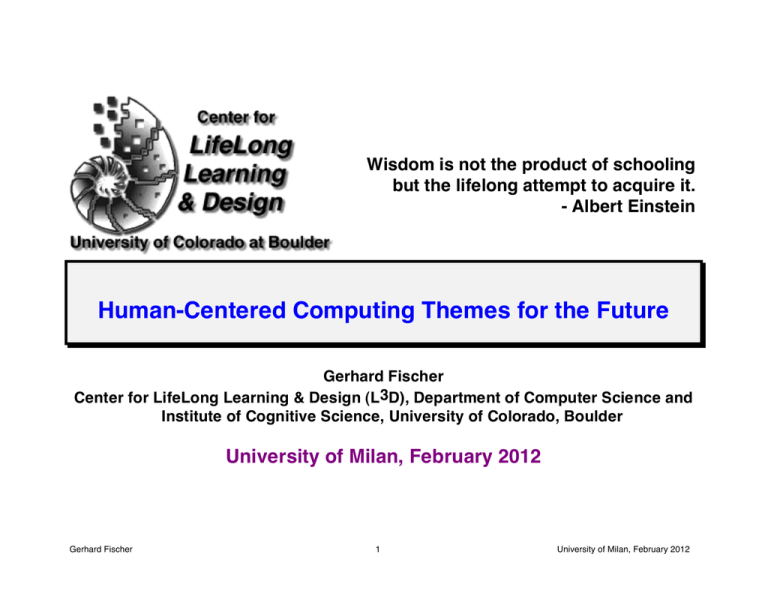
Wisdom is not the product of schooling
but the lifelong attempt to acquire it.
- Albert Einstein
Human-Centered Computing Themes for the Future
Gerhard Fischer
Center for LifeLong Learning & Design (L3D), Department of Computer Science and
Institute of Cognitive Science, University of Colorado, Boulder
University of Milan, February 2012
Gerhard Fischer
1
University of Milan, February 2012
Themes
Cultures of Participation
Meta-Design
Social Creativity
Distributed Cognition
Context-Aware Systems
Learning and Education in the 21st Century
Gerhard Fischer
2
University of Milan, February 2012
Matches / Mismatches between Teachers and Learners
Teacher
Student
Example
authority (“sage on
the stage”)
Dependent, passive
lecture without questions, drill
motivator and
facilitator
Interested
lecture with questions, guided
discussion
Delegator
Involved
group projects, seminar
coach/critic (“guide
on the side”)
self-directed,
discovery-oriented
self-directed study group,
apprenticeship, dissertation
teacher / learner = f{person} f{context}
Gerhard Fischer
3
University of Milan, February 2012
Wisdom is not the product of schooling
but the lifelong attempt to acquire it.
- Albert Einstein
Cultures of Participation
Gerhard Fischer
Center for LifeLong Learning & Design (L3D), Department of Computer Science and
Institute of Cognitive Science, University of Colorado, Boulder
University of Milan, February 2012
Gerhard Fischer
4
University of Milan, February 2012
Outline
Basic Message
Cultures of Participation
Examples of Innovative Socio-Technical Environments
Research Challenges
Conclusions
Gerhard Fischer
5
University of Milan, February 2012
Basic Message: Beyond the Unaided, Individual Human Mind
Gerhard Fischer
6
University of Milan, February 2012
Cultures of Participation
—
Fundamental Challenge and Opportunity
consumer cultures
focus: produce finished goods to be consumed passively
⇓
cultures of participation
focus: provide all people are with the means to participate actively in
personally meaningful problems
Gerhard Fischer
7
University of Milan, February 2012
Consumer Cultures
Examples:
- Television audiences
- Students in an instructionist classroom
References:
- Postman, N. (1985) Amusing Ourselves to Death—Public Discourse in the Age of
Show Business, Penguin Books, New York.
- Fischer, G. (2002) Beyond 'Couch Potatoes': From Consumers to Designers and
Active Contributors, in Firstmonday (Peer-Reviewed Journal on the Internet),
available at http://firstmonday.org/issues/issue7_12/fischer/.
Gerhard Fischer
8
University of Milan, February 2012
Comments about Cultures of Participation
“The experience of having participated in a problem makes a difference to
those who are affected by the solution. People are more likely to like a solution
if they have been involved in its generation; even though it might not make
sense otherwise” [Rittel, 1984].
“I believe passionately in the idea that people should design buildings for
themselves. In other words, not only that they should be involved in the
buildings that are for them but that they should actually help design them”
[Alexander, 1984].
“The hacker culture and its successes pose by example some fundamental
questions about human motivation, the organization of work, the future of
professionalism, and the shape of the firm” [Raymond & Young, 2001].
“Users that innovate can develop exactly what they want, rather than relying on
manufacturers to act as their (often very imperfect) agents” [von Hippel, 2005].
“The networked environment makes possible a new modality of organizing
production: radically decentralized, collaborative, and nonproprietary” [Benkler,
2006].
Gerhard Fischer
9
University of Milan, February 2012
Consumer and Designers — Beyond Binary Choices
claims:
- there is nothing wrong about being a consumer (watching a tennis match, listening
to a concert, ...)
- the same person wants to be a consumer in some situations and in others a
designer consumer / designer is not an attribute of a person, but of a context
consumer / designer ≠ f{person} f{context}
problems:
- someone wants to be a designer but is forced to be a consumer personally
meaningful activities
- someone wants to be a consumer but is forced to be a designer personally
irrelevant activities
Gerhard Fischer
10
University of Milan, February 2012
Cultures of Participation — Application Domains
Web 2.0
Learning 2.0
President 2.0
Science 2.0
Digital Libraries 2.0
Electricity 2.0 (Smart Grids)
Health 2.0
Crisis 2.0 (CNN versus Bloggers, Twitter, ……)
Gerhard Fischer
11
University of Milan, February 2012
Cultures of Participation — Concepts
prosumers (= producers + consumers)
pro-ams (= professionals + amateurs)
user-generated content
wisdom of crowds
crowd sourcing
long tail
What is needed:
a theoretical model to understand and foster
cultures of participation
Gerhard Fischer
12
University of Milan, February 2012
Elements of an Analytic Model: Understanding Strengths
to engage the talent pool of the whole world
to put owner of problems in charge
to make all voices heard
to reach extensive coverage
to expose artifacts to public scrutiny
Gerhard Fischer
13
University of Milan, February 2012
Elements of an Analytic Model: Understanding Weaknesses
collective is not always better
loss of individuality
accumulation of irrelevant information
lack of coherent voices
companies offload work to customers drawbacks of “Do-It-Yourself Societies”
customers lack the experience and the broad background knowledge to do tasks
efficiently and effectively
Gerhard Fischer
14
University of Milan, February 2012
Environments Created by Cultures of Participation
Site
Wikipedia
Objectives and Unique Aspects
web-based collaborative multilingual encyclopedia with a single,
collaborative, and verifiable article; authority is distributed
(http://www.wikipedia.org/)
iTunes U
courses by faculty members from “certified institutions”; control via input
filters; material can not be remixed and altered by consumers
(http://www.apple.com/education/itunes-u/)
YouTube
video sharing website with weak input filters and extensive support for
rating (http://www.youtube.com/)
Encyclopedia of documentation of the 1.8 million known living species; development of an
Life (EoL)
extensive curator network; partnership between the scientific
community and the general public (http://www.eol.org/)
SketchUp and
repository of 3D models created by volunteers organized in collections by
3D
curators and used in Google Earth
Warehouse
(http://sketchup.google.com/3dwarehouse/)
Gerhard Fischer
15
University of Milan, February 2012
Environments Created by Cultures of Participation
Scratch
Learning environment for creating, remixing, and sharing programs to build
creative communities in education (http://scratch.mit.edu)
Instructables
socio-technical environment focused on user-created and shared do-ityourself projects involving others users as raters and critics
(http://www.instructables.com/)
PatientsLikeMe collection of real-world experiences enabling patients who suffer from lifechanging diseases to connect and converse
(http://www.patientslikeme.com/)
Stepgreen
Gerhard Fischer
library of energy saving actions, tips, and recommendations by citizen
contributors for saving money and being environmentally responsible
(http://www.stepgreen.org/)
16
University of Milan, February 2012
Encyclopedia of Life
Gerhard Fischer
17
University of Milan, February 2012
SketchUp — a high-functionality 3D Modeling Environment
Gerhard Fischer
18
University of Milan, February 2012
3D Warehouse: a Web 2.0 Environment
http://sketchup.google.com/3dwarehouse/
features:
-
search, share, and store 3D models created in SketchUp
models include: buildings, houses, bridges, sculptures, cars, people, pets, …
download the 3D models to be modified in SketchUp
if the model has a location on earth download it and view it in Google Earth
challenges:
- what will motivate people to participate?
- participation requires acquiring skills in using SketchUp create learning
environments for SketchUp
Gerhard Fischer
19
University of Milan, February 2012
3D Warehouse
Gerhard Fischer
20
University of Milan, February 2012
CU Boulder in 3D
Gerhard Fischer
21
University of Milan, February 2012
Downtown Denver in 3D
Gerhard Fischer
22
University of Milan, February 2012
A Tiny Percentage of a Huge Population Large Number of Participants
Gerhard Fischer
23
University of Milan, February 2012
Richer Ecologies of Participation
in the past:
- software developers and users
- producers and consumers
- professionals and amateurs
in the future: more roles — beyond passive, undifferentiated consumers
- producers, raters, taggers, curators, stewards, active users, passive users
roles are distributed in communities:
- power users, local developers, gardeners
challenge: support migration paths with “low threshold, high ceiling”
architectures
Gerhard Fischer
24
University of Milan, February 2012
Richer Ecologies of Participation:
Consumer Contributor Collaborator Meta-Designer
Gerhard Fischer
25
University of Milan, February 2012
Ecologies in Open Source Communities
Gerhard Fischer
26
University of Milan, February 2012
The CreativeIT Wiki — http://l3dswiki.cs.colorado.edu:3232/CreativeIT/
Gerhard Fischer
27
University of Milan, February 2012
Example: Energy Sustainability
energy sustainability = a theme of national and worldwide importance
technical innovations:
- Smart Grid + Smart Meters
- advanced metering infrastructures
challenges of harvesting the benefits of technical innovations:
- most citizens are unaware of new technological developments (“energy illiteracy”)
- information presentation is poorly designed
- feedback alone is not persuasive enough to change human behavior
claim: all of these challenges are grounded in the intersection of human
behavior (at individual and social levels) and technology
Gerhard Fischer
28
University of Milan, February 2012
Socio-Technical Environments for Energy Sustainability
Electric Grid
Gerhard Fischer
Smart Grid
Human Grid
29
University of Milan, February 2012
Learning from and Being Motivated
by other’s Experiences
Gerhard Fischer
30
University of Milan, February 2012
Roles, Demands, and Activities for a Culture of
Participation in the Energy Domain
Gerhard Fischer
31
University of Milan, February 2012
Research Challenge
—
Different Models for
Knowledge Accumulation and Sharing
Model Authoritative
Model Democratic
Gerhard Fischer
32
University of Milan, February 2012
Model Authoritative underlying Consumer Cultures
“filter and publish”
Strong Input Filters, Small Information Repositories, Weak Output Filters
Limitation: Making All Voices Heard
Gerhard Fischer
33
University of Milan, February 2012
Model Democratic underlying Participation Cultures
“publish and filter”
Weak Input Filters, Large Information Repositories, Strong Output Filters
Limitation: Trust and Reliability of Information
Gerhard Fischer
34
University of Milan, February 2012
Passion and Intrinsic Motivation
utility = value / effort
-
-
SketchUp Building Maker = an easy-to-use tool for creating threedimensional buildings. Position building blocks on top of 2D aerial images to
quickly create realistic looking buildings.
Incremental Formalization
movies:
-
Gerhard Fischer
Staircases / Escalators
3D Modelers
35
University of Milan, February 2012
Conclusions
one of the most exciting innovations and transformations
-
Gerhard Fischer
past decades: digital media have provided new powers for the individual
future: the world's networks are providing enormous unexplored opportunities
for groups and communities
cultures of participation opportunities and challenges to provide all
citizens with the means to become co-creators of new ideas, knowledge, and
products in personally meaningful activities
36
University of Milan, February 2012
Relevant Perspectives for Cultures of Participation
social production Benkler, Y. (2006) “The Wealth of Networks: How Social
Production Transforms Markets and Freedom”
democratizing innovation von Hippel, E. (2005) “Democratizing Innovation”
richer ecologies of participation Preece, J., & Shneiderman, B. (2009) "The
Reader-to-Leader Framework: Motivating Technology-Mediated Social Participation"
mass collaboration Tapscott, D and Williams, A. (2006): “Wikinomics: How Mass
Collaboration Changes Everything”
wisdom of crowds Surowiecki, J. (2005): “The Wisdom of Crowds”
Web 2.0 O'Reilly, T. (2006): “What Is Web 2.0 - Design Patterns and Business
Models for the Next Generation of Software”
open source Raymond, E. S., & Young, B. (2001): “The Cathedral and the Bazaar:
Musings on Linux and Open Source by an Accidental Revolutionary”
learning / education Collins, A. and Halverson, R. (2009): “The Second
Educational Revolution: How Technology is Transforming Education Again”
Gerhard Fischer
37
University of Milan, February 2012
References for Cultures of Participation (L3D)
Fischer, G. (2009) "Cultures of Participation and Social Computing: Rethinking and
Reinventing Learning and Education." In Proceedings of the International Conference
on Advanced Learning Technologies (ICALT), IEEE Press, Riga, Latvia, pp. 1-5.
Fischer, G. (2010) "End-User Development and Meta-Design: Foundations for Cultures
of Participation," Journal of Organizational and End User Computing 22(1), pp. 52-82.
Fischer, G. (2011) "Understanding, Fostering, and Supporting Cultures of
Participation," ACM Interactions XVIII.3 (May + June 2011), pp. 42-53.
Gerhard Fischer
38
University of Milan, February 2012
